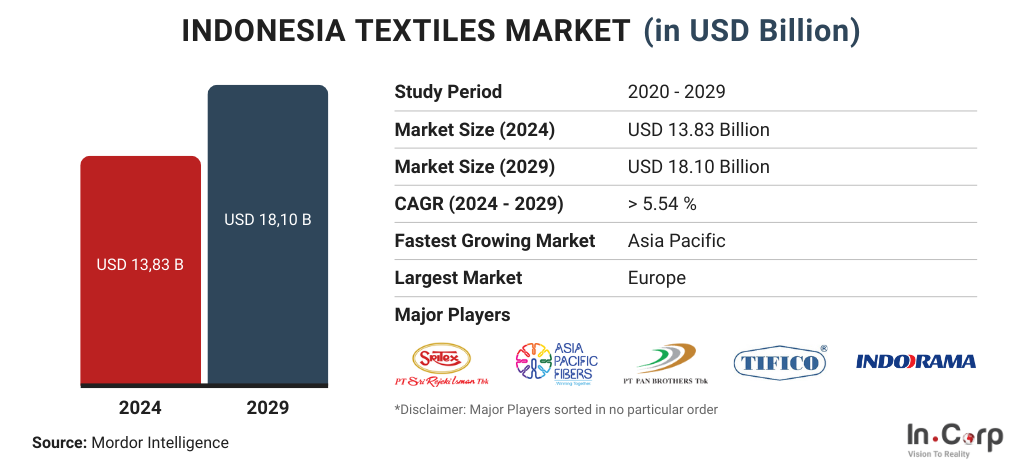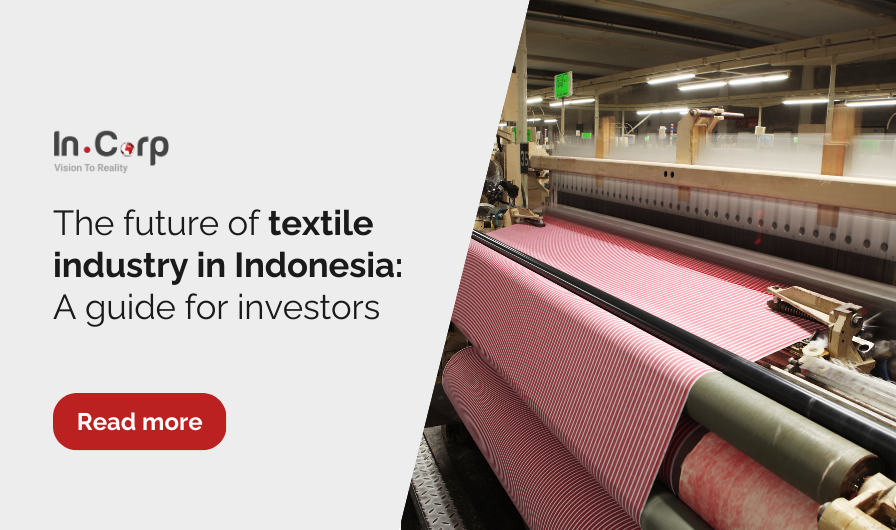Indonesia’s garment and textile industry is vital to its economy. It has a rich heritage and a promising future. This article delves into the intricate world of textiles and garments, exploring the opportunities and challenges within the Indonesian landscape.
What are the textile and garment industries?
The textile industry produces fibers, yarns, fabrics, and woven goods from cotton, wool, polyester, and nylon. It forms the foundation of the garment industry.
The garment industry transforms these textile fabrics into clothing. This involves cutting, sewing, finishing, and adding embellishments to create a variety of garments, from everyday wear to high fashion.
Essentially, the textile industry provides the raw materials, while the garment industry creates the final clothing products.
How does the textile industry work?
The textile industry functions through a complex network of interconnected processes:
- Fiber production: Natural fibers are grown or harvested, while synthetic fibers are produced in chemical plants.
- Yarn manufacturing: Fibers are spun into yarns by turning and twisting.
- Fabric production: Yarns are woven, knitted, or transformed into fabrics.
- Finishing: Fabrics undergo finishing processes like dyeing, printing, and treatment for specific properties.
- Garment manufacturing: Fabrics are delivered to garment factories to cut, sew, and assemble final clothing items.
- Distribution: Finished garments are distributed to retailers, wholesalers, and consumers.
Three types of textile industry
The textile industry can be further categorized into three main segments:
- Natural fiber textiles: This segment deals with the processing of natural fibers like cotton, wool, silk, and flax into yarns and fabrics.
- Manufactured fiber textiles: This segment produces synthetic fibers derived from chemical processes, such as polyester, nylon, acrylic, and rayon.
- Technical textiles: This segment caters to industrial applications, producing textiles for functions beyond clothing, such as medical textiles, automotive textiles, and geotextiles.
Textile vs. garment industry
While textiles and garments are intricately linked, they represent distinct stages in the clothing production value chain. Here’s a breakdown of the key differences:
| Aspect | Textile Industry | Garment Industry |
|---|---|---|
| Focus | Creation of fabrics and materials | Transformation of fabrics into finished clothing items |
| Raw materials | Utilizes natural or synthetic fibers | Relies on fabrics produced by the textile industry |
| Processes | Spinning, weaving, knitting, dyeing | Cutting, sewing, finishing, quality control |
| End products | Produces fabrics like cotton cloth or denim | Delivers finished clothing items like shirts, dresses, jackets |
Indonesia’s textile and garment industry

The textile and garment industry in Indonesia is expected to grow exponentially in the coming years. Data from Mordor Intelligence shows that the Indonesian textile market is estimated to reach USD 13.83 billion in 2024 and USD 18.10 billion by 2029, growing at a CAGR of over 5.54% (2024-2029).
Several factors drive this rapid expansion, including the labor force. 2023 there were about 5,000 active large and medium textiles and garment companies and around 500,000 active small and micro businesses.
Moreover, Indonesia benefits from access to a wide range of raw materials, including wool, silk, and various natural and synthetic fibers, ensuring reliable supply chains.
The growth of e-commerce and improvements in domestic logistics are also boosting local demand. Indonesia’s domestic apparel market was valued at USD 21.7 billion in 2023, with an annual growth rate of 3.5%.
Read more: Unveiling the prospects of the cosmetic industry in Indonesia
2024 outlook for Indonesia’s garment and textile industry
The trend for the Indonesia textile market in 2024 indicates the potential increase in cotton import and the practice of a sustainable market.
The rise of cotton import
Indonesian cotton imports are projected to increase by about 5.9% to around 1.8 million bales in 2023/24 compared to 2022/23.
This rise is anticipated as spinners are expected to use more existing inventory before making new purchases. Slowing global demand and tough competition from low-priced, illegal imports in the domestic market have led to lower cotton utilization and higher-end stocks of 379,000 bales in 2023/24.
Higher demand for sustainable market
Rising consumer awareness about fashion’s environmental and social impacts drives demand for ethically produced clothing.
In response, Indonesian designers and textile manufacturing are adopting fair trade practices, ensuring fair treatment of workers throughout the supply chain, and aligning with global sustainability standards.
In addition, Indonesia is embracing technologies such as 3D printing and innovative fabric development to enhance sustainability in its fashion industry further. These efforts are gaining global recognition, positioning Indonesia as a leading force in the green fashion movement.
Opportunities for foreign investors in the Indonesia textile industry
The optimistic projection of Indonesia’s textile industry for the coming years has opened a window of opportunities for investors; one of them is considering providing essential funding to the Indonesia garment manufacturing industry.
This funding will help local manufacturing companies develop their capacity to meet market demand.
Furthermore, the Indonesian government is increasing its support for the textile industry. The current administration has enhanced the country’s logistics by constructing new highways and ports.
It is also cracking down on the import of illegal textiles and tightening import regulations for textiles and textile products.
Singapore and China investment in Indonesia
Singapore and China are among the countries that have demonstrated significant investment interest in the Indonesian textile industry.
The Coordinating Ministry for Maritime Affairs and Investment has revealed the latest news on foreign companies’ investment plans to construct textile factories in Singapore and China.
Septian Hario Seto, Deputy for Investment and Mining Coordination at Kemenkomarves, stated that 11 textile companies are obtaining permits for investment in the country.
Although the total investment from these foreign companies has yet to be disclosed, the project is expected to create up to 40,000 jobs.
Challenges in Indonesia’s textile industry
Despite the lucrative opportunities, there are still challenges for the Indonesian textile industry.
Production cost
Energy and labor costs in Indonesia are considerably higher than those in other leading textile-producing countries. Electricity costs significantly impact overall production expenses.
Additionally, labor costs have been rising yearly, with the minimum wage increasing by 8.5% in 2020. These factors make cost management a complex issue for Indonesian textile producers, affecting their competitiveness globally.
Outdated machinery
Another significant obstacle to modernization is the industry’s reliance on outdated machinery. Much of Indonesia’s textile machinery is old, with about 70-80% being over 25 years old.
Strong competition
Indonesian textiles also face intense competition from regional players like Vietnam, Bangladesh, and China.
These countries have made significant advancements in textile production, often offering lower production costs and more advanced manufacturing capabilities.
For example, the export growth of the textile industry in Indonesia has been relatively stagnant compared to the robust growth in these competing countries.
Invest in Indonesia’s textile industry with InCorp
Indonesia’s textile and garment sector is poised for significant growth, and InCorp can be your partner in navigating this market. We offer tailored services designed to simplify your business journey:
- Company registration: Our team handles all the complexities of company formation in Indonesia, saving you valuable time and resources.
- Business licensing: We ensure you obtain the necessary licenses to operate legally and compliantly within the Indonesian textile industry.
Unlock the full potential of Indonesia’s thriving textile industry by clicking the button below.
Get in touch with us.
What you'll get
A prompt response to your inquiry
Knowledge for doing business from local experts
Ongoing support for your business
Disclaimer
The information is provided by PT. Cekindo Business International (“InCorp Indonesia/ we”) for general purpose only and we make no representations or warranties of any kind.
We do not act as an authorized government or non-government provider for official documents and services, which is issued by the Government of the Republic of Indonesia or its appointed officials. We do not promote any official government document or services of the Government of the Republic of Indonesia, including but not limited to, business identifiers, health and welfare assistance programs and benefits, unclaimed tax rebate, electronic travel visa and authorization, passports in this website.



